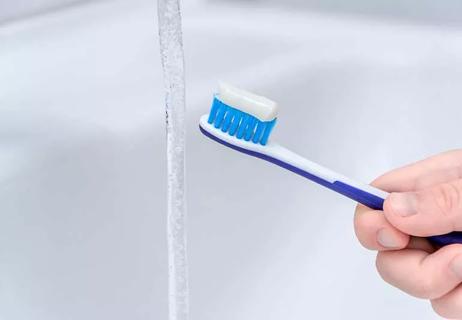Cavities, grinding or even a sinus infection could be behind your tooth pain

You bite into a crisp apple, and ouch! You drink a glass of cold water, and oy! Or maybe you’re doing nothing and all and — zing! — tooth pain strikes at random.
Advertisement
Cleveland Clinic is a non-profit academic medical center. Advertising on our site helps support our mission. We do not endorse non-Cleveland Clinic products or services. Policy
Whether it only happens when your teeth are in use or you just can’t seem to shake that underlying ache, tooth pain deserves your care and attention. Your oral health contributes to your overall health, so tooth pain could be trying to tell you something important.
But what could it be?
“Pain in your teeth and gums shouldn’t be ignored,” says periodontist Sasha Ross, DMD, MS. “Things like loose teeth, cracked or broken teeth can all indicate that there’s a problem — and even if the problem isn’t visible to you, it’s important to have it checked out.”
She teams up with general dentist Anne Clemons, DMD, to walk you through some of the most common causes of tooth pain.
If your childhood goal was to be a perpetual part of the No Cavity Club, tooth pain may be a sign that it’s time to turn in your membership card. A cavity happens when your tooth enamel erodes and creates a tiny hole in your tooth.
When a cavity is caught early (say, during your biannual dentist visit), it can often be treated before it causes any pain. But untreated cavities can be excruciating — and damaging.
“When cavities get severe enough and get close to your nerve, they can cause significant pain that may require seeing an endodontist, in other words, a root canal specialist, to do a root canal,” Dr. Ross says. “In some cases, you could have to have the tooth removed.”
Advertisement
It seems like you’d know if you had a problem with grinding your teeth, but all too often, people have no idea — especially if it happens overnight, while you’re fast asleep. Bruxism, which can happen overnight or during the day, can lead to jaw pain and loose teeth, and over time, it can wear down the enamel of your teeth.
Your dentist can’t stop you from grinding, but they can lessen its effect on your teeth. “We can fit you with a custom nightguard that provides you with a stable bite and can reduce the contraction of your jaw muscles,” Dr. Clemons says. And there are things you can do to try to stop grinding your teeth.
Bruxism is one of a few temporomandibular joint disorders (TMD), conditions that affect the jaw joints and the muscles and ligaments around them. Others include:
In addition to damaging your teeth, these disorders can cause symptoms like jaw pain and headaches, so it’s important to talk to your provider about treatment.
Any time you hear the word “abscess,” you can probably expect it to be accompanied by some pain. An abscess is a pocket of pus that’s usually caused by an infection, and it can happen anywhere on your body. An abscessed tooth, then, is a pocket of pus that forms around your tooth.
There are three kinds of tooth abscesses:
“There’s no way to tell on your own what kind of tooth abscess you have,” Dr. Clemons says. “For that, you’ll need to see a dentist who can diagnose it and treat the underlying infection.” Options include an incision to drain the pus, a root canal or a tooth extraction.
Another source of tooth pain could be a root fracture, a crack on the root of your tooth. This type of dental injury can be difficult to diagnose because it happens deep below the surface of your teeth and gums. Your provider can’t see them just by looking inside your mouth.
“Even if we take a two-dimensional X-ray in the office, it’s very rare that a root fracture will show,” Dr. Ross notes. “If we suspect it, we will send you to an endodontist, a root canal specialist who will do some tests on the tooth.”
A 3D scan called a cone beam CT scan can show bone loss around your tooth, which often indicates a root fracture. “If that’s the case, the tooth often does need to be pulled,” Dr. Ross says.
Sinus infections can make you miserable in a whole slew of ways, including headache, stuffy nose and cough. And you can add tooth pain to the list, too.
Advertisement
“When your sinus passages are infected, they can get blocked or filled up with fluid,” Dr. Clemons explains. “That can put pressure on your cheeks and teeth and make your whole face hurt.”
Oh, and what’s one of the primary causes of sinus infections? You guessed it: seasonal allergies. Even if your allergies don’t lead to a sinus infection (fingers crossed), they can still put similar pressure on your sinus cavities and, thus, on the rest of your face.
You know how babies cry a lot when they’re teething? That’s because it hurts when new teeth break through — and in teens and adults, the same is true when wisdom teeth start to make their debut.
“Your wisdom teeth usually come in between ages 17 to 21, but they’re not always visible,” Dr. Clemons warns.
Plus, wisdom teeth may be partially in your gums or jawbone, which can make them more painful, harder to clean and more prone to infection. This is why they so often need to be removed.
It’s not always easy to differentiate between different types of mouth pain. “There are some non-tooth related issues that can cause pain you might mistake for tooth pain,” Dr. Ross says. That includes:
Advertisement
A much rarer possibility is trigeminal neuralgia, a facial pain disorder that can mask as tooth pain. “That needs to be treated by a neurologist or a pain management specialist,” Dr. Ross states.
Gum (periodontal) disease is an infection of your gums, and it can get worse with time. But it doesn’t usually cause tooth pain.
“Perhaps ironically, gum disease rarely causes pain in the mouth,” Dr. Ross says. “Even if it’s very, very severe, this is rarely a cause of pain that leads patients to see their dentist or periodontist on an emergent basis.”
There are other symptoms of gum disease, though, like:
If you’re seeing your dentist twice a year, they can often diagnose and treat early gum disease. But it’s also worth making an annual appointment with a periodontist.
“The common treatment for periodontal disease is a deep cleaning or scaling and root cleaning, where we numb you up and clean the tarter beneath your gums,” Dr. Ross explains. Periodontists can also treat complex gum disease.
If your pain is new and mild or moderate, it’s OK to try to ride it out for a bit to see if it goes away on its own (especially if you know you have allergies or a sinus infection). “If you feel like the pain is tolerable and you want to try to wait it out, give it about two weeks,” Dr. Ross advises. “If it hasn’t gone away in that time, call your dentist.”
But, she says, see your dentist sooner if you start to experience:
Advertisement
“It’s so important to take care of your teeth and your mouth, both for your health and your happiness,” Dr. Ross says. “It never hurts to see your dentist or periodontist!”
To learn more about oral health from Dr. Ross, listen to the Health Essentials Podcast episode, “Keeping Your Mouth Healthy.” New episodes of the Health Essentials Podcast publish every Wednesday.
Learn more about our editorial process.
Advertisement

Despite unfounded theories, fluoride has the power to make your teeth stronger

Most recommended precautions center around minimizing bruising or swelling

Even one drink can have an impact on your cognitive function leading to slurred speech, blurred vision and impaired memory

Understand who may (and may not) benefit

Lorem ipsum dolor sit amet. Et odio Quis vel ipsam omnis eum alias deleniti et placeat impedit non voluptas galisum hic autem enim et cupiditate aliquid. Est beatae quidem non facilis autem ut commodi nisi aut tempore rerum et dolores voluptatem cum enim optio id sapiente quasi. Ad laboriosam officiis 33 cupiditate sequi ea voluptatum consectetur qui necessitatibus voluptate et quasi doloremque et facere explicabo quo explicabo officia

Seeking help through therapy can be an important step in improving your quality of life when you have UC

Type 2 diabetes isn’t inevitable with these dietary changes

Applying a hot or cold compress can help with pain